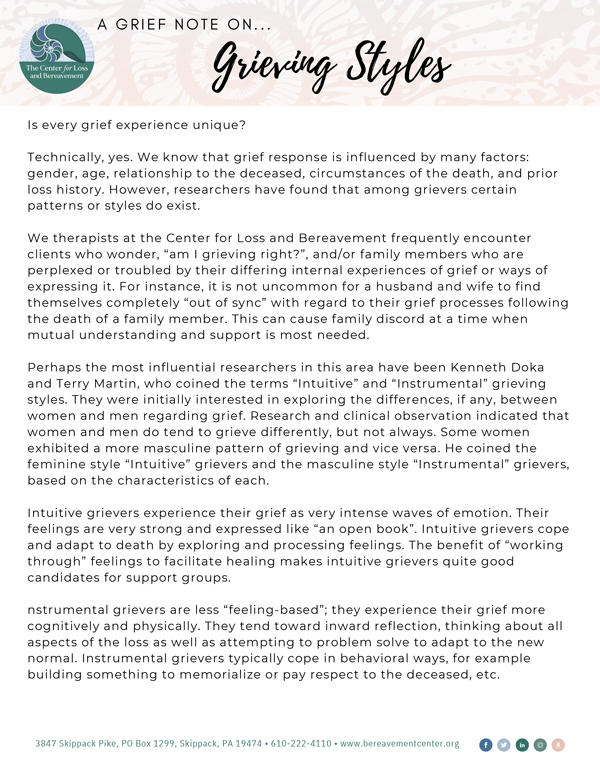CLB Grief Notes
A Grief Note On…
Grieving Styles
Is every grief experience unique?
Technically, yes. We know that grief response is influenced by many factors: gender, age, relationship to the deceased, circumstances of the death, and prior loss history. However, researchers have found that among grievers certain patterns or styles do exist.
We therapists at the Center for Loss and Bereavement frequently encounter clients who wonder, “am I grieving right?”, and/or family members who are perplexed or troubled by their differing internal experiences of grief or ways of expressing it. For instance, it is not uncommon for a husband and wife to find themselves completely “out of sync” with regard to their grief processes following the death of a family member. This can cause family discord at a time when mutual understanding and support is most needed.
Perhaps the most influential researchers in this area have been Kenneth Doka and Terry Martin, who coined the terms “Intuitive” and “Instrumental” grieving styles. They were initially interested in exploring the differences, if any, between women and men regarding grief. Research and clinical observation indicated that women and men do tend to grieve differently, but not always. Some women exhibited a more masculine pattern of grieving and vice versa. He coined the feminine style “Intuitive” grievers and the masculine style “Instrumental” grievers, based on the characteristics of each.
Intuitive grievers experience their grief as very intense waves of emotion. Their feelings are very strong and expressed like “an open book”. Intuitive grievers cope and adapt to death by exploring and processing feelings. The benefit of “working through” feelings to facilitate healing makes intuitive grievers quite good candidates for support groups.
Instrumental grievers are less “feeling-based”; they experience their grief more cognitively and physically. They tend toward inward reflection, thinking about all aspects of the loss as well as attempting to problem solve to adapt to the new normal. Instrumental grievers typically cope in behavioral ways, for example building something to memorialize or pay respect to the deceased, etc.
Doka and Martin carefully elaborated, however, that the two grieving styles, intuitive and instrumental, are actually extremes on a continuum. In other words, the great majority of grievers exhibit “a blend” between the two styles, i.e., have characteristics of each. They went on to say that neither style is by definition superior to the other and that each has aspects that facilitate healthy adaptation to the loss.
Interestingly, another researcher, Lisa Prosser-Dodds, Ph.D., has done studies attempting to ascertain whether personality has an impact on grief. She enlisted grieving individuals to take a variety of standardized personality tests to assess what/if any relationship there is between personality and grieving style. Her results indicated that, indeed, personality type does impact behaviors, attitudes, and approaches to grief. She issued the caveat, however, that more work needs to be done in this area.
We therapists and support group facilitators at the Center have been well educated on the various factors that influence the grief process. We steadfastly strive to create a therapeutic environment that validates and supports each and every client’s grief experience and attempts to cope and adapt.
Join Our
Mailing List
Donate
Today
Request
Information

Affiliations
• NACG
• CBEM Changemaker
• ADEC
• Charity Navigator
Quick Links
About Us
Individual & Family Grief Counseling
Volunteer
News
Grief Support Resources
Contact
Ph: 610-222-4110
Fax: 610-222-4116
3847 Skippack Pike
P.O. Box 1299
Skippack, PA 19474
Support The Center For
Loss and Bereavement
